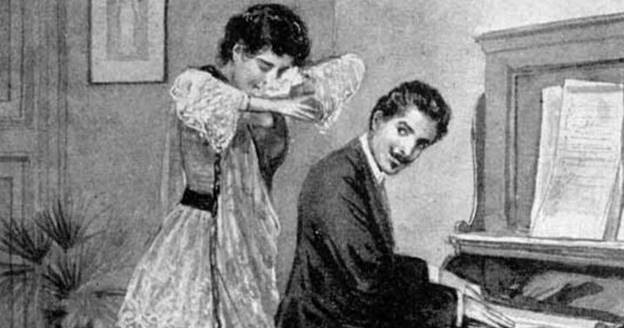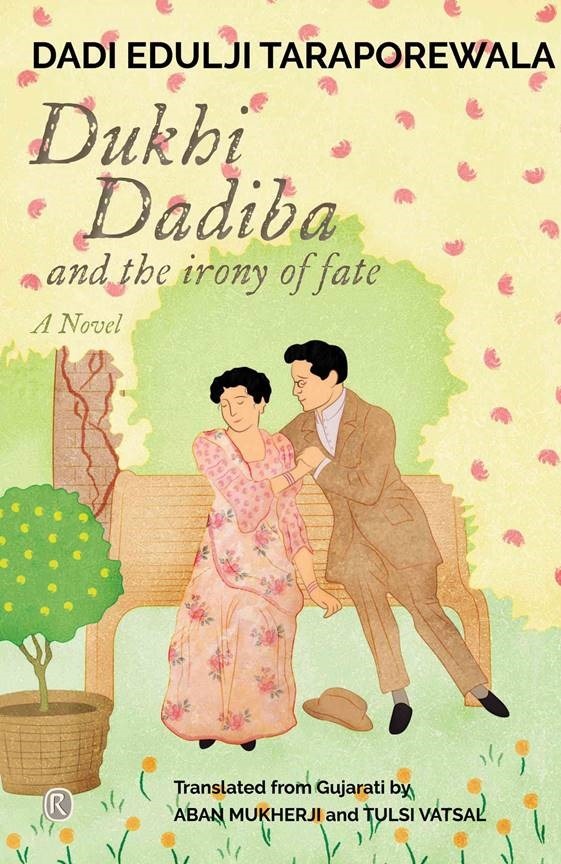In this 19th-century tragic love story, a young Parsi woman has to choose between money and love
An excerpt from ‘Dukhi Dadiba and the Irony of Fate’, by Dadi Edulji Taraporewala. Translated from the Gujarati by Aban Mukherji and Tulsi Vatsal.
Dadi Edulji Taraporewala & Tulsi Vatsal and Aban Mukherji
An illustration from the book. | MV Dhurandhar.
[I will now take the opportunity to tell my readers something about the young Dadiba and beautiful Pareen.]
Pareen was the fun-loving daughter of a prominent gentleman. Her father Darashah Davar was a well-known figure in Mumbai. He was a mill-owner and possessed considerable property at Mahalakshmi. He thought so highly of the Davar name that no other family was good enough in his estimation. Except for this one shortcoming, Darashah Davar was a model gentleman. Pareen’s mother Meherbai had six children. Five daughters and one son. The son who was the eldest looked after the mills and the estate of his father. Pareen was the youngest and prettiest and the undoubted favourite of the five girls. The older four were married into respectable families. Only Pareen remained single.
None of her sisters could match Pareen’s looks. Her erect posture and lissome gait, her swelling breasts, her small sharp nose, the blush on her pale cheeks and her swan-like neck – she was, as her name suggested, truly a pari, a fairy. 19 years old, in the full bloom of her youth, Pareen could truly capture the heart of any young man.
Pareen’s father was keen to see her married. But no prospective suitor seemed good enough for Darashah Davar. Thanks to his wife Meherbai’s persistence, and the efforts of her acquaintances, there was no dearth of proposals. But Darashah Sheth invariably found something or the other lacking in every offer. Pareen herself was keen on getting married and had not been averse to some of the proposals. But her disdainful father had dismissed them out of hand. Though Pareen lived in the lap of luxury, she became increasingly impatient to have a home of her own. The years passed. She grew lovelier but her heart remained untouched. Until now, when Dadiba’s love conquered it.
Dadiba was Pareen’s music teacher, engaged by Darashah Davar for a fee of Rs 200 a month. Dadiba taught Pareen various musical instruments as well as English. The generous fee was a tribute to Dadiba’s exceptional musical talent. Well known throughout Mumbai for his mastery over the violin, he was also profi cient in a number of other instruments like the piano, harmonium, dilruba, sitar, guitar and fiddle. Moreover, Dadiba was uncommonly handsome. His friends teased him saying, “God set out to fashion a woman and by mistake created you.” He had large blue eyes and a broad forehead over which a lock of hair escaped from under his black velvet cap. And as if his good looks weren’t enough, Dadiba was also blessed with a sweet musical voice, which complemented his instrumental skills. Despite this, Dadiba did not give himself airs. Simply dressed, soft spoken and without envy, he stood out in a crowd. He won the confidence of one and all with his straightforward ways.
Dadiba had been engaged by Darashah Sheth on condition that he would not offer his services to anyone else. Within a mere six months, Pareen’s musical skills and English had improved so much that even Darashah Davar could not help singing the tutor’s praises to all his acquaintances.
Pareen herself was more than happy to have a teacher who was not only famous for his musical talents but was handsome to boot, and she would make it a point to boast about him to her friends. Day by day, hour by hour, her relationship with Dadiba changed. New, unaccountable feelings for her teacher caused a tumult in her heart. She, hitherto a diligent pupil, soon found it impossible to concentrate; her fingers refused to strike the right notes on the piano. Dadiba would hide a smile behind his whiskers. For he too had fallen in love with Pareen, and interpreted her agitation as a sign that his feelings were being reciprocated. Soon Pareen lost her formal, polite reserve and began talking more freely with him. She would give in to the prompting of her heart and brush against Dadiba as if by accident, and then apologise sweetly.
Then finally one day, when Dadiba happened to correct a mistake Pareen had made while playing “Marceau de Salon” on the piano, she burst out, “But yesterday you taught me differently, my love!”
The words had finally been spoken. A surprised Dadiba stopped playing and broke into delighted laughter. He looked long at Pareen’s face. True, the words had escaped from Pareen’s mouth unintentionally. But Dadiba was too much a man of the world to let the opportunity slip. Taking Pareen’s hand in his, he declared his love. “Thanks to you, the moment I have been waiting for has come at last. No man could be more fortunate than I.” Then he asked, “When can we meet in private?’
“I will send you a note this evening,” Pareen replied, her face suffused with joy.
Excerpted with permission from Dukhi Dadiba and the Irony of Fate, Dadi Edulji Taraporewala, translated from the Gujarati by Aban Mukherji and Tulsi Vatsal, Ratna Books.


